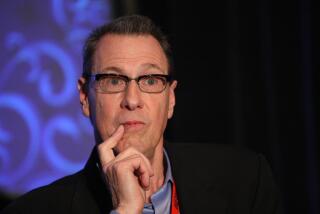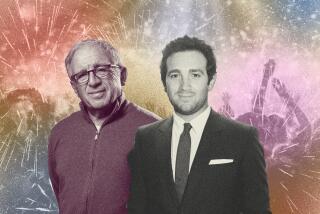How I Made It: Rob Wells
- Share via
The gig: Rob Wells is president of global digital business at Universal Music Group. With a global staff of 75 and an office that sits next to the company’s chief executive in Santa Monica, Wells must chart the digital course for the world’s largest record company.
The opening act: Wells landed his first record company job in 1994 at BMG Entertainment in his native Britain, where his job included sorting through the company’s fan mail and building a database of customer names and addresses for promotional mailings. His annual salary was 9,880 pounds, or roughly $15,400.
“My boss always reminded me that I got the job because I was tall and strong so I could reach high places and lift the post bag,” Wells said, chuckling.
The headliner: Wells turned a low-level marketing gig into career gold when he was sitting in a meeting about how to let fans know about a new album from Take That, a British pop group.
Because the mailing list Wells had been working on grew so large, sending an announcement through the mail would cost more than half of the album’s total marketing budget. As BMG’s executives debated what should be done, Wells piped up, “Why don’t we just send emails? They’re free.”
One executive replied: “That’s a brilliant idea! What’s email?”
From then on, the company changed its marketing plans to embrace the Internet. In 1996, Wells was named BMG’s head of digital.
The drum solo: In 2000, Wells moved to Universal as director of new media and digital services. It was two years after a college dropout named Shawn Fanning unleashed his first version of Napster, a software that enabled users to download music for free. The music industry, which saw the technology as enabling piracy on a massive scale, managed to shut down Napster in 2001. But the technology was already out of the barn, and over the next decade music sales dropped by more than half.
Wells regarded technology differently. “I’m tired of the industry telling consumers what they can and can’t do,” Wells said. “We need to empower our customers and tell them what they can do. We need to provide as many legitimate music services as possible. Being innovative and giving people alternatives is the best weapon we have against piracy.”
Among the company’s more novel deals was one with SingTel, a telecommunications company in Singapore. Struck in 2008 and launched with a performance byLady Gaga,the arrangement allowed SingTel’s Amped music service to license Universal’s music catalog.
“We work with every legitimate music service on the planet,” he said.
The encore: Universal has thousands of deals in place with all manner of digital music services worldwide, Wells said. Aside from telecommunications companies, Universal also has deals with companies that use music to promote their brands, including European carmaker PSA Peugeot Citroen, which gave away songs for a year in a marketing campaign.
“Our modus operandi is to find partners, feed them market intelligence, help them establish new services and expand existing ones,” Wells said.
The closer: Asked whether a music label is still a good place for young, aspiring workers, Wells pointed to his own division at Universal. At 41, he is the third-oldest employee in his group of more than 75.
“The notion that we’re all just a bunch of fat cat executives is inaccurate,” he said. “If you look around my department, the average age is under 30 years old. They’re young, dynamic people. You walk around the floor here, there’s music playing, people are actively debating the topics of the day and talking about new ways people can experience music. It’s still a very vibrant business.
“Best of all, it’s a glorious meritocracy. I started at the lowest level possible, and I’ve managed to work myself up the ranks of two major labels. If you have talent and you have ideas, you will invariably find things to do.”
More to Read
Inside the business of entertainment
The Wide Shot brings you news, analysis and insights on everything from streaming wars to production — and what it all means for the future.
You may occasionally receive promotional content from the Los Angeles Times.










